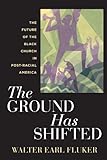The ground has shifted : the future of the Black church in post-racial America / Walter Earl Fluker.
Material type: TextSeries: Publication details: New York : New York University Press, (c)2016.Description: 1 online resource (xi, 313 pages)Content type:
TextSeries: Publication details: New York : New York University Press, (c)2016.Description: 1 online resource (xi, 313 pages)Content type: - text
- computer
- online resource
- 9781479817016
- BR563 .G768 2016
- COPYRIGHT NOT covered - Click this link to request copyright permission: https://lib.ciu.edu/copyright-request-form
| Item type | Current library | Collection | Call number | URL | Status | Date due | Barcode | |
|---|---|---|---|---|---|---|---|---|
 Online Book (LOGIN USING YOUR MY CIU LOGIN AND PASSWORD)
Online Book (LOGIN USING YOUR MY CIU LOGIN AND PASSWORD)
|
G. Allen Fleece Library ONLINE | Non-fiction | BR563.53 (Browse shelf(Opens below)) | Link to resource | Available | ocn959274564 |
Includes bibliographies and index.
. From Frogbottom to a bucket of blood -- Haunted houses : Black churches and the ghost of post-racialism -- Cultural hauntings : Black church leadership and Barack Obama -- Turning from dilemma to diaspora -- Turning from exodus to exile -- Turning from the frying pan to the fire -- Just above our heads: a meditation from the middle -- Returning to the little house where we lived and made do -- Cultural asylums and the jungles they planted in them -- Waking up the dead.
Honorable Mention, Theology and Religious Studies PROSE Award A powerful insight into the historical and cultural roles of the black churchIf we are in a post-racial era, then what is the future of the Black Church? If the US will at some time in the future be free from discrimination and prejudices that are based on race how will that affect the church's very identity?In The Ground Has Shifted, Walter Earl Fluker passionately and thoroughly discusses the historical and current role of the black church and argues that the older race-based language and metaphors of religious discourse have outlived their utility. He offers instead a larger, global vision for the black church that focuses on young black men and other disenfranchised groups who have been left behind in a world of globalized capital.Lyrically written with an emphasis on the dynamic and fluid movement of life itself, Fluker argues that the church must find new ways to use race as an emancipatory instrument if it is to remain central in black life, and he points the way for a new generation of church leaders, scholars and activists to reclaim the black church's historical identity and to turn to the task of infusing character, civility, and a sense of community among its congregants.
COPYRIGHT NOT covered - Click this link to request copyright permission:
There are no comments on this title.
